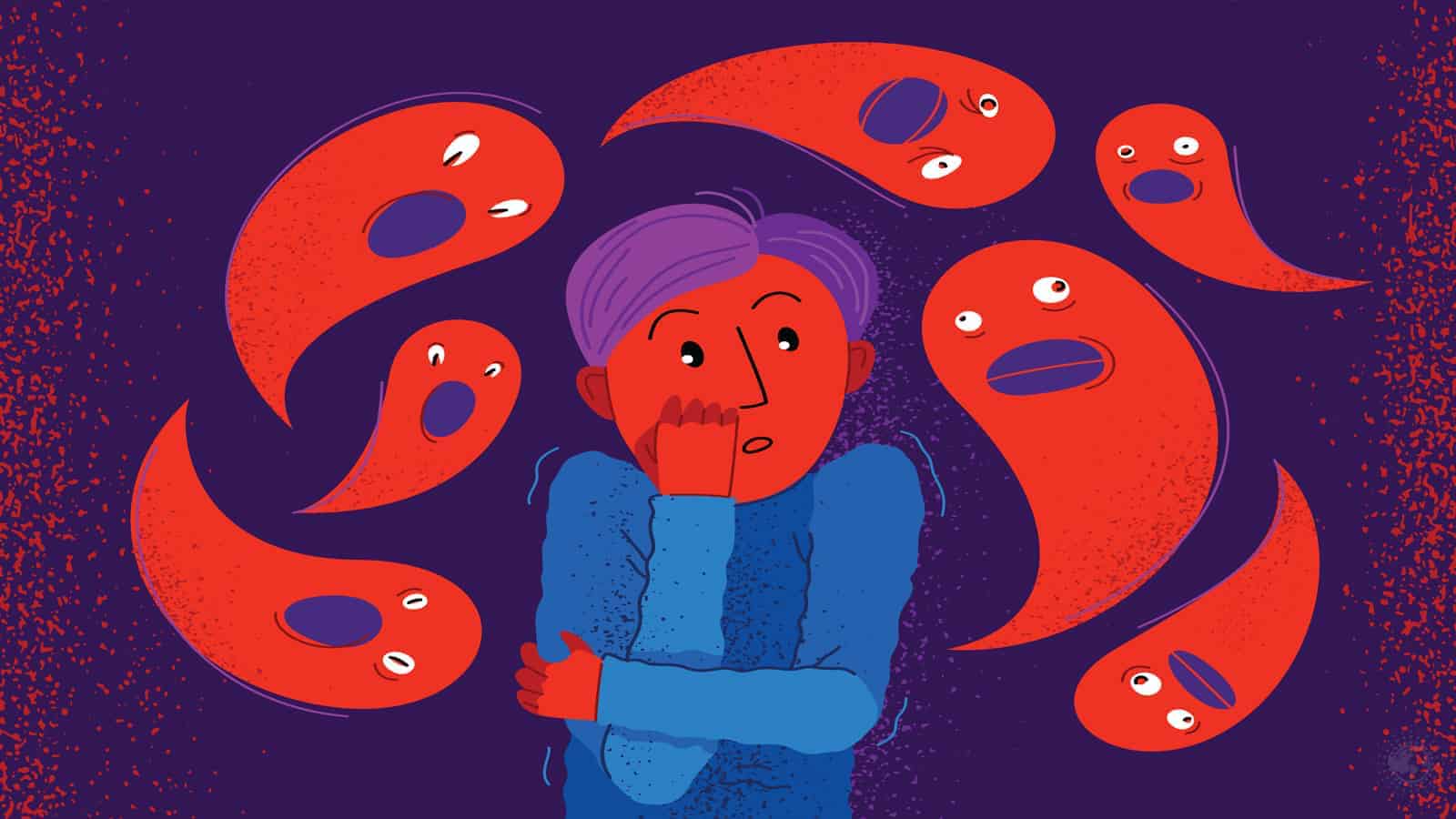If you know someone you think could be paranoid, you may be curious about their behaviors. Here are 10 common behaviors of someone who is paranoid.
What is paranoia?
Paranoia, according to a recent study, paranoia has two main characteristics:
- A belief that something bad that’s going to happen
- A belief that people are out to hurt them
Paranoia sufferers have feelings of being watched or threatened by people around them. Paranoia is common, although it varies in intensity and frequency in people. Everyone is a little paranoid once in a while, especially when you’re feeling vulnerable. You may worry about things, even if you know they aren’t based on reality.
But clinical paranoia is different. It’s associated with a mental health disorder that causes sufferers to live with constant anxiety and fear that people are trying to cheat, lie or hurt them. It’s an incapacitating disorder.
10 behaviors common that reveal someone is paranoid
There are some common symptoms of people who suffer from paranoia. They may present themselves a bit differently depending upon the person and the severity of their condition. Here are the behaviors you may see in someone you think could be paranoid. According to the National Institute on Health, here are a few of the primary red flags.
1 – Mistrust
People who are paranoid have a hard time trusting people. They assume that people are going to hurt them. Because of this, they will limit their social contact with people. They begin to question their family members’ loyalty, assuming they are trying to exploit or deceive them.
2 – Looking for hidden meanings
Similar to mistrust, a paranoid person questions people’s motives, assuming they mean harm. They look for hidden meanings in what people say or do. If someone looks over at them, they suddenly feel suspicious of the person’s intentions.
3 – Feeling betrayed
Feelings of betrayal are common for a person suffering from paranoia. They assume their partner is unfaithful to them or their boss is planning to fire them. It’s hard to convince them otherwise.
4 – Always on guard
A person who struggles with paranoia is constantly alert, watching and waiting for someone or something to hurt them. They feel persecuted by the government or their family. They can’t let their guard down and won’t share personal information for fear it will be used against them.
5 – Hard time forgiving
Those who suffer from paranoid aren’t able to forgive people. Instead, they’ll hold grudges and seek revenge. They assume the person who apologized was lying to them. Besides, they feel like they’re never wrong about what they do or their assessments of people.
6 – Defensive of imagined criticism
Ready to defend themselves, paranoid people get hostile if they think someone is criticizing them. They keep a distance from family members, and if they do have a partner, they will become jealous and critical of them.
7 – Suspicious of others motives
They are very private and suspicious. If a delivery person says hello, they’ll read something negative into it. Their fears feed these suspicions, and often they get caught up in conspiracy theories, which only adds to their suspicions.
8 – Worried about being deceived
Paranoid people worry that other people are trying to deceive them. This is why it’s so hard to help them. They assume the wrong motives of those closest to them. This worry causes them stress, which can lead to deeper paranoia symptoms.
9 – Argumentative
Those who suffer from paranoia believe they are always right. Anyone who disagrees with them is perceived as wanting to hurt them. They will retaliate and react in anger when someone tries to explain why they’re wrong. Paranoid people get hostile and stubborn, refusing to cooperate at any level because cooperation would be admitting they are wrong.
10 – Can’t relax
Constant fears, worries, and distrust of people make paranoid people high-strung and unable to relax. They believe the government or others are out to get them, so they must be vigilant. They can’t sleep, which can lead to worse paranoia symptoms.
How are people with paranoia diagnosed?
If you or someone you love is suffering from paranoia, seek help from a doctor. The doctor will evaluate to make the proper diagnosis. Here are things you can expect the doctor will do to diagnosis paranoia.
- Your medical history: They will ask you about your medical history going back to your childhood. They will ask you about your family’s medical history and if others have suffered from a similar condition.
- A physical examination: This may include blood work to eliminate other conditions similar to paranoia but have a medical cause.
- Ask about your symptoms: Your doctor will ask you for a detailed description of the symptoms to better understand what you’re going through to see if you have paranoia.
- Psychological tests: Your regular doctor may do these, but a psychiatrist or psychologist will often administer these tests.
- Tests to rule out other mental health disorders: These tests may be administered by a psychiatrist or psychologist rather than your doctor. Other disorders are similar to paranoia, so it’s important to get the right diagnosis.
What causes a person to be paranoid?
Paranoia is caused by some breakdown in a person’s mental and emotional capacities, especially in their ability to reason and explain their emotions. Doctors aren’t sure about root causes, but there are some reasons why people may get this condition.
- Genetics: Some researchers believe that there is a genetic link to paranoia, though they aren’t sure why it’s not always inherited.
- Substance abuse: Another reason could be due to marijuana, cocaine, or amphetamines that change a person’s brain chemistry.
- Traumatic events in your life: Child abuse can disrupt a person’s ability to think and feel properly.
- Stress: Severe stress can cause it. This is seen in soldiers who’ve experienced war.
- A mixture of these situations: Researchers believe that paranoia could result from any of these combinations.
How is paranoia treated?
Paranoia has no cure, but some treatments can help a person suffering from paranoia live a happier life that is productive. Of course, the treatment will depend upon how severe the condition is and how well the individual responds to the treatment. Treatments for paranoia include the following:
- Medication: Antipsychotic and anti-anxiety drugs help with paranoia symptoms. Sadly, it can be difficult for a paranoid person to trust their doctor, so they may refuse to take the medication for fear the doctor is trying to poison them.
- Coping strategies: Another helpful treatment is helping them learn to function in social settings. This may include some relaxation techniques to help lower their anxiety.
- Behavior modification is another successful coping strategy for paranoia. A person with paranoia may not want to participate in therapy until they totally trust their therapist. This can take a long time. So, the success of any therapy may be slow.
- Hospital stay: if the paranoia is severe enough, the person may need hospitalization to help them. This can feed their paranoia and cause anxiety and stress. Once the person is stabilized, they can begin other therapies.
For the person suffering from paranoia, there needs to be a trusting relationship between them and their therapists to reduce their fears and help them with their social skills. It can take years for a person with paranoia to progress and recover.
What if someone you know is paranoid?
If you suspect that someone you know or love has paranoia, you may feel at a loss about how to help them. Here are some suggestions that may help you.
1 – Ask yourself if what they believe could be true?
Sometimes individuals get dismissed as paranoid, but there are legitimate reasons for their paranoia. Please don’t assume they are wrong. Check it out first.
2 – Try to understand
Even if you don’t understand their fears, try to understand the root of their anxiety. It could help you understand why they believe these things.
3 – Talk with them
Express your desire to understand them. Listen to their concerns and fears with an open mind. Please give them the benefit of the doubt. They may be isolating themselves from so many people. You are their only open ear.
4 – Be careful not to dismiss their fears.
You may disagree with their fears of the government conspiracy, but don’t dismiss their fears. Their feelings are real to them, even if they aren’t based in reality.
5 – Affirm their feelings.
Admit their feelings without agreeing or disagreeing with them. You can’t force their feelings to change. They will feel threatened by you and pull away if you respond negatively.
How to get help for someone who is paranoid
You can’t make a person with paranoia get help if they don’t want help. If you push them, it will only cause them to pull away from you, assuming you have bad motives. Reassure them of your love and concern. Tell them it’s okay to get help. Always respect their desires, even if you’re sure they need help.
What about an emergency?
If you know, the paranoid person is getting worse and possibly heading towards a mental health crisis that could cause them to harm themselves or someone else. You need to act. You should contact a mental health crisis line immediately to get help from a trained person in these situations.
Final thoughts on determining if someone is paranoid
People who suffer from paranoia have difficulty coping in social settings like work, family gatherings, or at school. They may have mild to severe symptoms and display them, especially when they feel stress. Hopefully, these symptoms, treatment, and the ways you can help them will guide you to help your friend or loved one.
















 Community
Community

